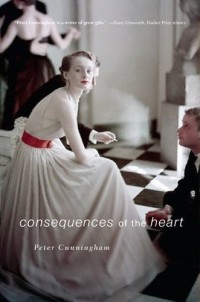The Upright Piano Player by David Abbott
 Wednesday, June 8, 2011 at 8:44AM
Wednesday, June 8, 2011 at 8:44AM 
Published by Nan A. Talese on June 7, 2011
David Abbott blends light comedy with tragic drama in a first novel that reads like the work of a seasoned writer. The Upright Piano Player begins in 2004 at the funeral of Henry Cage's beloved grandson Hal, a death for which Henry blames himself. The story then begins anew, this time in 1999. Forced into retirement from the business he founded, divorced from Neesa (a documentary filmmaker whose well-publicized affair Henry refused to forgive), Henry's solitary idleness leads to trouble: he's kicked out of the restaurant after a customer complains that Henry has been staring at the customer's girlfriend, and his home is vandalized after he complains that the BBC weather report gives undue attention to Scotland. Not knowing whether the vandalism is connected to the staring or to his criticism of the weather report, Henry resolves to stay awake at night to protect his home -- an endeavor that fails when he falls asleep while a mysterious envelope slides under his front door. The contents of the envelope eventually lead to the novel's most dramatic moment. Much of the story, however, concerns Henry's faltering attempts to make amends with Neesa and their son Tom.
Although the novel's focus is on Henry, other key characters have stories of their own. Neesa is dealing with twin regrets: the cancer that will soon rob her of her life and the fact that Henry is no longer part of it. Tom has had no contact with his father for years until he finally breaks the news that Henry has a four-year-old grandson. Colin Bateman, the anger-driven boyfriend of the woman at whom Henry was staring, ekes out a living taking photographs but his violent behavior undermines his ability to hold a steady job. All of David Abbott's characters are realistic, filled with flaws and idiosyncrasies and difficulties. Even the minor characters, like Henry's housekeeper, Mrs. Abraham, and Maude Singer, Henry's one-time lover and an on-and-off employee of the business that fired him, have carefully honed personalities.
At one point, Henry wonders whether his disconcerting relationship with Bateman is punishment for his "various failings." Henry's most significant failing is his self-centered nature: he blames himself for things that aren't his fault because he believes he causes things to happen when he is actually the random victim of misfortune. It's an interesting take on a common trait, a failure of introspection that I haven't seen explored in quite that way in any other novel.
The Upright Piano Player paints a convincing picture of an uncompromising man. Henry's refusal to compromise the integrity of his business might be admirable, although it ultimately costs him his career. Perhaps, in his personal life, it is the same inability to compromise that damaged his relationships with both Neesa and Tom. My most significant complaint about the book is that we really don't know; little can be gleaned from the text about the true nature of Henry's role as husband and father. My other, less serious disappointment with the novel is the lack of transition between the events of 2004 and the story that begins in 1999. The disconnect between the two time frames struck me as a bit jarring.
Given the serious nature of the subject matter, the tone is surprisingly light for much of the novel, although it darkens toward the end. The misfortunes that bedevil the characters are balanced with enough irreverent humor to keep the book from becoming maudlin. The story is briefly told yet comfortably paced. Abbott's prose style is winning. I look forward to reading his next effort.
RECOMMENDED



